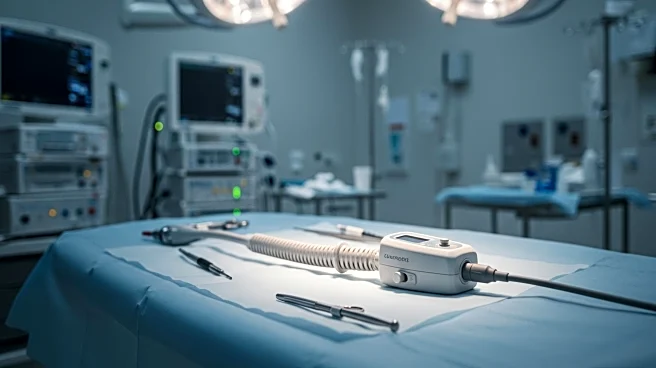What's Happening?
Simpson Interventions, a medical technology company specializing in cardiovascular devices, has announced the successful treatment of the first patients using its Acolyte Image-Guided Crossing and Re-Entry Catheter System. This marks the beginning of a pivotal IDE clinical trial aimed at evaluating the system's safety and effectiveness in treating coronary chronic total occlusions (CTOs) with persistent symptoms following medical therapy. The trial is being conducted at Emory University Hospital, with plans to treat a minimum of 103 lesions across up to 15 sites. The Acolyte System offers real-time visualization of intravascular morphology, potentially improving the reliability and predictability of revascularization procedures for CTOs.
Why It's Important?
The initiation of this clinical trial is significant as it addresses the challenges faced by interventional cardiologists in treating CTOs, which are considered complex due to complete artery blockages. Current standard care options often fail to cross these lesions, leading to invasive coronary artery bypass surgery or reliance on medical therapy alone. The Acolyte System, designated as a Breakthrough Device by the FDA, aims to provide a minimally invasive solution, potentially benefiting patients, cardiologists, hospitals, and payers by reducing the need for more invasive procedures and improving patient outcomes.
What's Next?
As the clinical trial progresses, the medical community will closely monitor the results to assess the Acolyte System's effectiveness and safety. Successful outcomes could lead to broader adoption of the technology, offering a new standard of care for CTOs. Simpson Interventions will continue to work with the FDA's Total Product Life Cycle Advisory Program to ensure the device meets high-quality standards. Future regulatory approvals and commercialization strategies will depend on consistent positive trial results.
Beyond the Headlines
The development of the Acolyte System highlights the ongoing innovation in medical technology aimed at improving cardiovascular treatment options. It underscores the importance of visual-guidance and electromechanical automation in enhancing minimally invasive procedures. The trial's success could pave the way for further advancements in treating complex cardiovascular conditions, potentially influencing future research and development in the field.









